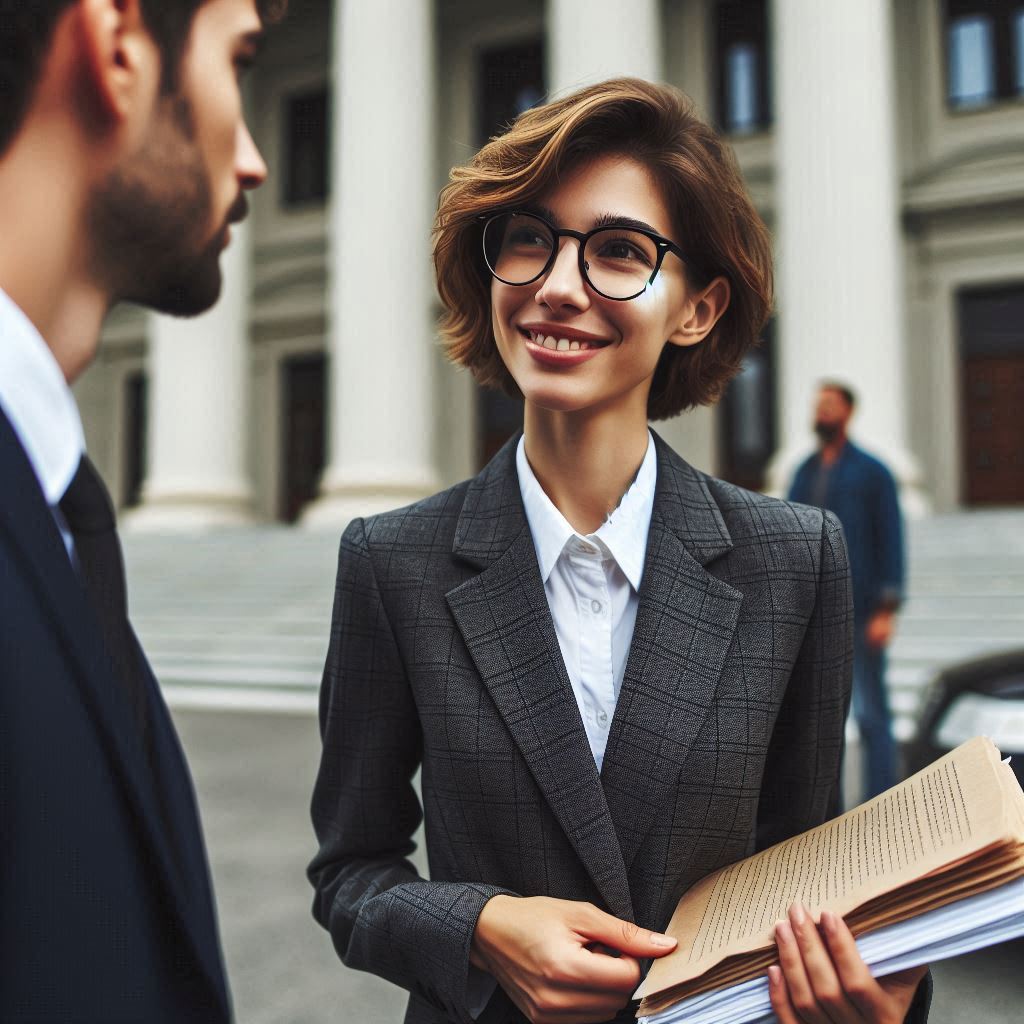Introduction
Prosecutors play a crucial role in the legal system.
They bring criminal charges against individuals, represent the government in court, and seek justice for victims.
Their decisions can shape the course of legal history, influencing public opinion and legal precedents.
In this blog, we will highlight some of the most influential prosecutors throughout history and explore their significant contributions to the legal field.
Robert H. Jackson served as the Chief U.S. Prosecutor at the Nuremberg Trials.
He played a key role in prosecuting Nazi war criminals after World War II.
Jackson‘s opening statement at the trials set the tone for the proceedings, emphasizing the importance of holding leaders accountable for war crimes.
His work at Nuremberg established important precedents in international law and laid the foundation for modern war crimes tribunals.
Vincent Bugliosi
Vincent Bugliosi gained fame for prosecuting Charles Manson and his followers for the Tate-LaBianca murders.
His meticulous preparation and compelling arguments led to the conviction of Manson and several of his associates.
Bugliosi later detailed the case in his book “Helter Skelter,” which became a bestseller.
His work demonstrated the power of thorough investigation and effective prosecution in securing justice.
Marcia Clark served as the lead prosecutor in the O. J. Simpson murder trial.
Despite the trial’s controversial outcome, Clark’s efforts brought national attention to issues of race, celebrity, and the criminal justice system.
Her dedication and tenacity in pursuing the case, despite immense public scrutiny, highlighted the challenges prosecutors face in high-profile cases.
Rudy Giuliani made his mark as the U. S. Attorney for the Southern District of New York.
He spearheaded numerous high-profile cases against organized crime and corrupt politicians in the 1980s.
Giuliani‘s aggressive tactics and success in securing convictions earned him a reputation as a tough and effective prosecutor.
His work significantly disrupted organized crime operations and inspired future legal strategies against such entities.
Kamala Harris
Kamala Harris served as the District Attorney of San Francisco and later as the Attorney General of California.
Harris focused on criminal justice reform, implementing initiatives to reduce recidivism and address systemic issues within the legal system.
Her work in these roles paved the way for her subsequent career in national politics, where she continues to influence legal and policy decisions.
In essence, Famous prosecutors like Robert H.
Jackson, Vincent Bugliosi, Marcia Clark, Rudy Giuliani, and Kamala Harris have left indelible marks on legal history.
Their work has shaped public perception, influenced legal precedents, and contributed to significant reforms within the criminal justice system.
Through their dedication and skill, these prosecutors have demonstrated the profound impact that committed legal professionals can have on society.
The Role of a Prosecutor in the Legal System
A prosecutor plays a vital role in the legal system.
They are responsible for presenting the case against an accused person in criminal trials.
Prosecutors investigate crimes, decide whether to bring charges, and then prove those charges in court.
They work closely with law enforcement to gather evidence and interview witnesses.
A prosecutor must ensure that the accused receives a fair trial while advocating for the state’s interest in securing justice.
Prosecutors also have the duty to disclose exculpatory evidence to the defense.
This ensures that justice is not only about convicting the guilty but also about protecting the innocent.
Their ethical obligations require them to seek the truth, uphold the law, and maintain public trust in the legal system.
The prosecutor’s role is both powerful and complex, balancing the pursuit of justice with the rights of the defendant.
The Significance of Prosecutors in Ensuring Justice
Prosecutors are crucial in maintaining the rule of law and ensuring justice is served.
Their decisions on whether to file charges can significantly impact individuals and communities.
By pursuing cases of corruption, violence, and other crimes, prosecutors help uphold societal norms and protect public safety.
They act as gatekeepers of the criminal justice system, determining which cases move forward to trial.
Effective prosecutors help deter crime by enforcing laws and holding offenders accountable.
They work to ensure that victims receive justice and that the criminal justice system operates fairly and efficiently.
Prosecutors also play a role in shaping legal precedents through the cases they bring to court.
Their work often influences public policy and legal reforms, further emphasizing their critical role in society.
Cases Where Prosecutors Have Made a Significant Impact
Throughout history, several prosecutors have left a lasting impact on legal history.
One notable example is Robert H.
Jackson, who served as Chief U.S.
Prosecutor at the Nuremberg Trials after World War II.
His work helped establish the principles of international law and accountability for war crimes.
Jackson’s dedication to justice set a precedent for future international tribunals.
Another influential prosecutor is Rudy Giuliani, who served as the U.S. Attorney for the Southern District of New York in the 1980s.
He spearheaded major cases against organized crime and corporate fraud.
Giuliani’s aggressive tactics and successful prosecutions significantly disrupted the Mafia’s operations and led to substantial legal reforms in financial regulations.
Kamala Harris, as District Attorney of San Francisco, also made a significant impact.
She focused on criminal justice reform, including initiatives to reduce recidivism and improve prisoner reentry programs.
Her work in California set a model for similar reforms nationwide, emphasizing the importance of rehabilitation alongside prosecution.
In a nutshell, prosecutors are essential in the criminal justice system.
Their duties and responsibilities are vast, requiring a balance between advocacy and ethical conduct.
By ensuring justice is served, prosecutors uphold the rule of law and protect society.
The impact of notable prosecutors throughout history highlights their critical role in shaping legal and social landscapes.
Read: Role of Prosecutors in the Juvenile Justice System
Profile famous prosecutors from the past
Vincent Bugliosi
Vincent Bugliosi, a renowned prosecutor, left a significant mark on legal history.
He is best known for prosecuting Charles Manson and his followers for the Tate-LaBianca murders in 1969.
Bugliosi’s meticulous preparation and compelling presentation of evidence were crucial in securing convictions for all the defendants.
His approach to the case was methodical.
Bugliosi focused on building a narrative that connected Manson‘s charismatic influence over his followers to the brutal crimes they committed.
He used witness testimonies effectively, especially that of Linda Kasabian, a former member of Manson‘s ‘Family‘ who turned state‘s witness.
Bugliosi‘s ability to tie Manson directly to the murders despite his absence at the crime scenes was a masterclass in prosecutorial strategy.
Bugliosi’s success in this case highlighted the importance of narrative in the courtroom.
His work set a precedent for how prosecutors could handle high-profile and complex cases involving multiple defendants and intricate conspiracies.
His book, “Helter Skelter,” detailing the Manson trial, remains a seminal work for both legal professionals and the general public.
Marcia Clark
Marcia Clark gained national fame as the lead prosecutor in the O. J. Simpson murder trial in 1995.
This case was one of the most publicized trials in American history.
Clark’s prosecution of Simpson for the murders of his ex-wife Nicole Brown Simpson and her friend Ron Goldman was intensely scrutinized.
Clark’s approach was thorough and evidence-driven.
She presented DNA evidence, which was relatively new at the time, to link Simpson to the crime scene.
Her team faced numerous challenges, including the defense’s effective questioning of the LAPD’s handling of evidence and allegations of racial bias.
Despite her diligent efforts, Simpson was acquitted.
The case highlighted significant issues within the criminal justice system, particularly regarding race, celebrity, and media influence.
Clark‘s experience in the trial underscored the immense pressure and scrutiny faced by prosecutors in high-profile cases.
Her perseverance and dedication, despite the trial’s outcome, left a lasting impression on legal history and public consciousness.
Strategies and Approaches
Both Bugliosi and Clark exhibited distinct prosecutorial strategies that reflect broader themes in legal practice.
Bugliosi’s method of crafting a coherent and compelling narrative showed the power of storytelling in court.
His ability to link seemingly disparate pieces of evidence into a convincing story helped secure convictions in a complex case.
Clark’s emphasis on scientific evidence, particularly DNA, showcased the growing importance of forensic science in the courtroom.
Her rigorous preparation and focus on factual evidence set a standard for future prosecutors dealing with cases involving advanced scientific methods.
Both prosecutors demonstrated the critical role of preparation, narrative construction, and the strategic use of evidence in achieving successful prosecutions.
Their careers and high-profile cases continue to influence and inspire prosecutors, highlighting the profound impact these legal professionals can have on the justice system and society.
Read: Challenges Faced by Public Defenders Daily
The impact of famous prosecutors on legal reforms
Prosecutors play a critical role in the criminal justice system, as they are responsible for representing the government in criminal cases and pursuing charges against individuals accused of committing crimes.
While prosecutors are often known for their role in securing convictions, some have had a lasting impact on legal reforms through their actions.
Influence on changes in laws and policies
Several famous prosecutors have used their positions to advocate for changes in laws and policies to improve the criminal justice system.
For example, Robert M. Morgenthau, the longtime District Attorney of Manhattan, was a staunch advocate for criminal justice reform and played a key role in pushing for tougher laws on white-collar crime and domestic violence.
Similarly, Vincent Bugliosi, the prosecutor in the Charles Manson trial, used his experience to push for reforms in the justice system.
Bugliosi’s work on high-profile cases highlighted the need for changes in how the legal system dealt with complex and high-profile criminal cases.
Catalysts for Legal Reforms
Some prosecutors have become catalysts for legal reforms by taking a stand on controversial issues and advocating for change.
For example, Kamala Harris, the former Attorney General of California, implemented criminal justice reforms aimed at reducing recidivism rates and addressing systemic inequalities in the justice system.
Another example is Marilyn Mosby, the State’s Attorney for Baltimore, who has been a vocal advocate for police accountability and transparency.
Mosby’s efforts to hold law enforcement officers accountable for misconduct have sparked debates and discussions on the need for reform within the criminal justice system.
Shaping the criminal justice system
Famous prosecutors have played a significant role in shaping the criminal justice system by taking on cases that have led to changes in laws and policies.
For example, William Kunstler, a prominent defense attorney turned prosecutor, was known for taking on controversial cases that challenged the status quo and led to changes in the legal system.
Linda Fairstein, the former prosecutor in the Central Park jogger case, used her experience to advocate for policies benefiting victims of sexual assault and improving the handling of rape cases.
Fairstein’s work raised awareness about the importance of victim advocacy and led to changes in how sexual assault cases were prosecuted.
In review, famous prosecutors have had a significant impact on legal reforms by advocating for changes in laws and policies, serving as catalysts for change, and shaping the criminal justice system through their actions.
Read: Public Defender Workload: What to Expect

The challenges faced by famous prosecutors
When it comes to famous prosecutors, their impact on legal history is undeniable.
These individuals have shaped the course of justice and made significant contributions to the legal field.
However, their journey has not been without challenges. Let’s examine the obstacles faced by famous prosecutors and how they have overcome them to achieve justice.
Upholding the Law
- One of the key challenges faced by famous prosecutors is the pressure to uphold the law.
- They are tasked with ensuring that justice is served and that the guilty are held accountable for their actions.
- This responsibility can be daunting, especially when high-profile cases are involved.
Dealing with Public Scrutiny
- Famous prosecutors often find themselves under public scrutiny, with their every move being closely watched.
- They are expected to act with integrity and professionalism at all times, despite the pressure.
- This can take a toll on their personal and professional lives, as the stakes are high.
Handling Complex Cases
- Prosecutors often face the challenge of handling complex cases that require a great deal of time and resources.
- They must gather evidence, build a strong case, and present it convincingly in court.
- This can be overwhelming, especially when the case is high-stakes or involves influential individuals.
Balancing Personal and Professional Life
- Prosecutors have to juggle demanding caseloads with their personal lives, leading to a work-life balance challenge.
- Long hours, high stress levels, and intense pressure can take a toll on their well-being.
- It can be difficult to maintain relationships and pursue personal interests while excelling in their legal careers.
Facing Opposition and Threats
- Famous prosecutors often face opposition from defense attorneys, judges, and even the defendants themselves.
- They may also receive threats and backlash from individuals who disagree with their legal actions.
- This can be intimidating and create a hostile work environment for prosecutors.
Coping with Failure and Criticism
- Prosecutors have to deal with failure and criticism, especially when a case does not end in conviction.
- They may face backlash from the public and media, questioning their abilities and decisions.
- This can be disheartening and challenging for prosecutors, who strive for justice in every case.
In fact, famous prosecutors face numerous challenges in their pursuit of justice.
From upholding the law to handling complex cases and dealing with public scrutiny, these individuals navigate a complex legal landscape.
However, by overcoming these obstacles with resilience, determination, and a commitment to justice, they leave a lasting impact on legal history.
Their personal and professional struggles only serve to highlight their dedication to the pursuit of justice and making a difference in the legal field.
Explore Further: Legal Secretary vs. Paralegal: Key Differences
Analyze the ethical dilemmas faced by prosecutors
Prosecutors play a crucial role in the criminal justice system, as they are responsible for presenting the case against the defendant.
However, along with their duties come significant ethical considerations that must be carefully navigated.
Transform Your Career Today
Unlock a personalized career strategy that drives real results. Get tailored advice and a roadmap designed just for you.
Start NowEthical considerations for prosecutors
- Prosecutors must ensure they are pursuing justice rather than personal gain or political motives.
- They are obligated to disclose all evidence, including exculpatory evidence, to the defense.
- Prosecutors should avoid conflicts of interest and maintain impartiality in their decision-making.
- They must uphold the legal rights of the accused, including the right to a fair trial.
- Prosecutors are expected to act in the interest of the public and seek a just resolution to the case.
Cases of criticism against prosecutors
- In the case of the Central Park Five, prosecutors were criticized for coercing false confessions.
- Prosecutors in the Duke Lacrosse case faced backlash for pursuing charges without sufficient evidence.
- The wrongful conviction of innocent individuals due to prosecutorial misconduct has also raised ethical concerns.
Impact of ethical misconduct on the legal system
- When prosecutors engage in unethical behavior, it can lead to wrongful convictions and miscarriages of justice.
- Public trust in the criminal justice system can be eroded when misconduct is uncovered.
- Ethical breaches by prosecutors can undermine the integrity of the entire legal system.
- Legal repercussions, such as overturned convictions, may result from prosecutorial misconduct.
Read: How to Prepare for a Career as a Prosecutor
Portrayal of Prosecutors in Popular Culture
Prosecutors hold a significant role in popular culture, often being portrayed in various forms of media such as movies, television shows, and literature.
These portrayals shape the public’s perception of prosecutors and their work, influencing how people view the legal system as a whole.
How Prosecutors are Portrayed in Movies
- In movies, prosecutors are often depicted as hard-working and dedicated individuals who are committed to seeking justice.
- They are shown as relentless in their pursuit of the truth, willing to go to great lengths to ensure that the guilty are held accountable.
- Prosecutors in movies are also commonly portrayed as heroic figures, fighting against adversity and corruption to uphold the law.
In Television Shows
- Television shows often portray prosecutors as complex characters with both strengths and flaws.
- They are shown navigating the legal system, making tough decisions, and dealing with the moral dilemmas that come with their job.
- Prosecutors in television shows are sometimes depicted as overzealous or unethical, adding drama and suspense to the storyline.
How Prosecutors are Portrayed in Literature
- In literature, prosecutors are portrayed in a variety of ways, depending on the genre and themes of the work.
- They can be shown as protagonists or antagonists, with their actions driving the plot forward and shaping the narrative.
- Some authors choose to delve into the emotional and psychological aspects of being a prosecutor, providing a nuanced portrayal of the profession.
Accuracy of Portrayals Compared to Real-Life Prosecutors
While popular culture often takes creative liberties with its portrayals of prosecutors, there are some elements that accurately reflect the reality of the profession.
For example, the dedication and hard work shown in movies and television shows mirror the commitment that many real-life prosecutors have to seeking justice.
However, there are also aspects of these portrayals that deviate from the truth.
For instance, prosecutors in popular culture are sometimes depicted as engaging in unethical behavior or bending the rules to win cases.
In reality, most prosecutors adhere to strict ethical standards and uphold the law with integrity.
Overall, while popular culture may take artistic liberties with its portrayals of prosecutors, there are kernels of truth that resonate with real-life experiences in the legal profession.
Influence of Popular Culture on Public Perception of Prosecutors
The way prosecutors are depicted in popular culture can have a profound impact on how the public perceives them.
For many people, their understanding of prosecutors and the legal system is informed by what they see in movies, television shows, and literature.
When prosecutors are portrayed as heroes who fight for justice, it can inspire confidence in the legal system and reinforce the idea that prosecutors are essential for upholding the rule of law.
On the other hand, negative portrayals of prosecutors as corrupt or unethical can erode trust in the legal system and sow seeds of doubt about the integrity of prosecutors.
Ultimately, popular culture plays a powerful role in shaping public perceptions of prosecutors, highlighting the importance of accurate and nuanced portrayals of the legal profession in media.
Conclusion
Prosecutors play a crucial role in the justice system.
They represent the state in criminal cases and ensure justice is served.
Throughout history, some prosecutors have left an indelible mark on legal history.
Their landmark cases and legal strategies have shaped the judicial landscape and influenced future legal practices.
This chapter explores the lives and legacies of some of the most famous prosecutors.
Robert H. Jackson’s career exemplifies dedication to justice.
As the Chief U.S. Prosecutor at the Nuremberg Trials, he prosecuted Nazi war criminals.
His meticulous preparation and compelling arguments highlighted the atrocities of the Holocaust.
Jackson’s work established important precedents for international law.
His efforts reinforced the principle that individuals, regardless of rank, are accountable for war crimes.
Vincent Bugliosi gained fame for prosecuting Charles Manson and his followers for the Tate-LaBianca murders.
Bugliosi’s methodical approach and persuasive presentation secured convictions.
His work demonstrated the power of thorough investigation and strategic prosecution.
Bugliosi also wrote “Helter Skelter,” which detailed the case and became a bestselling true crime book.
His legacy continues to influence prosecutors and legal professionals.
Before his political career, Rudy Giuliani made a name as a formidable prosecutor.
As U. S. Attorney for the Southern District of New York, he targeted organized crime and corruption.
Giuliani’s successful prosecutions of mafia leaders and corrupt officials showcased his relentless pursuit of justice.
Final note
These prosecutors have significantly impacted legal history through their dedication, skill, and determination.
Robert H. Jackson set international law precedents.
Vincent Bugliosi showcased the power of thorough investigation.
Rudy Giuliani tackled organized crime with tenacity.
Janet Reno reformed and strengthened the justice system.
Their work underscores the critical role of prosecutors in upholding justice and the rule of law.
Prosecutors ensure that criminals are held accountable and that justice is served.
Their work protects society and maintains public trust in the legal system.
By examining the careers of famous prosecutors, we gain insight into the complexities and challenges of the legal profession.
Learning about these legal figures can inspire future generations of legal professionals.
Their stories highlight the importance of integrity, dedication, and skill in the pursuit of justice.
We should continue to honor their contributions and strive to uphold the principles they championed.
Understanding their impact helps us appreciate the vital role prosecutors play in our society.
[E-Books for Sale]
The Big Book of 500 High-Paying Jobs in America: Unlock Your Earning Potential
$19.99 • 500 High-Paying Jobs • 330 pages
Explore 500 high-paying jobs in America and learn how to boost your career, earn more, and achieve success!
See All 500 High-Paying Jobs of this E-Book
1001 Professions Without a Degree: High-Paying American Jobs You Can Start Now
$19.99 • 1001 Professions Without a Degree • 174 pages
Discover 1001 high-paying jobs without a degree! Unlock career tips, skills, and success strategies for just $19.99!




